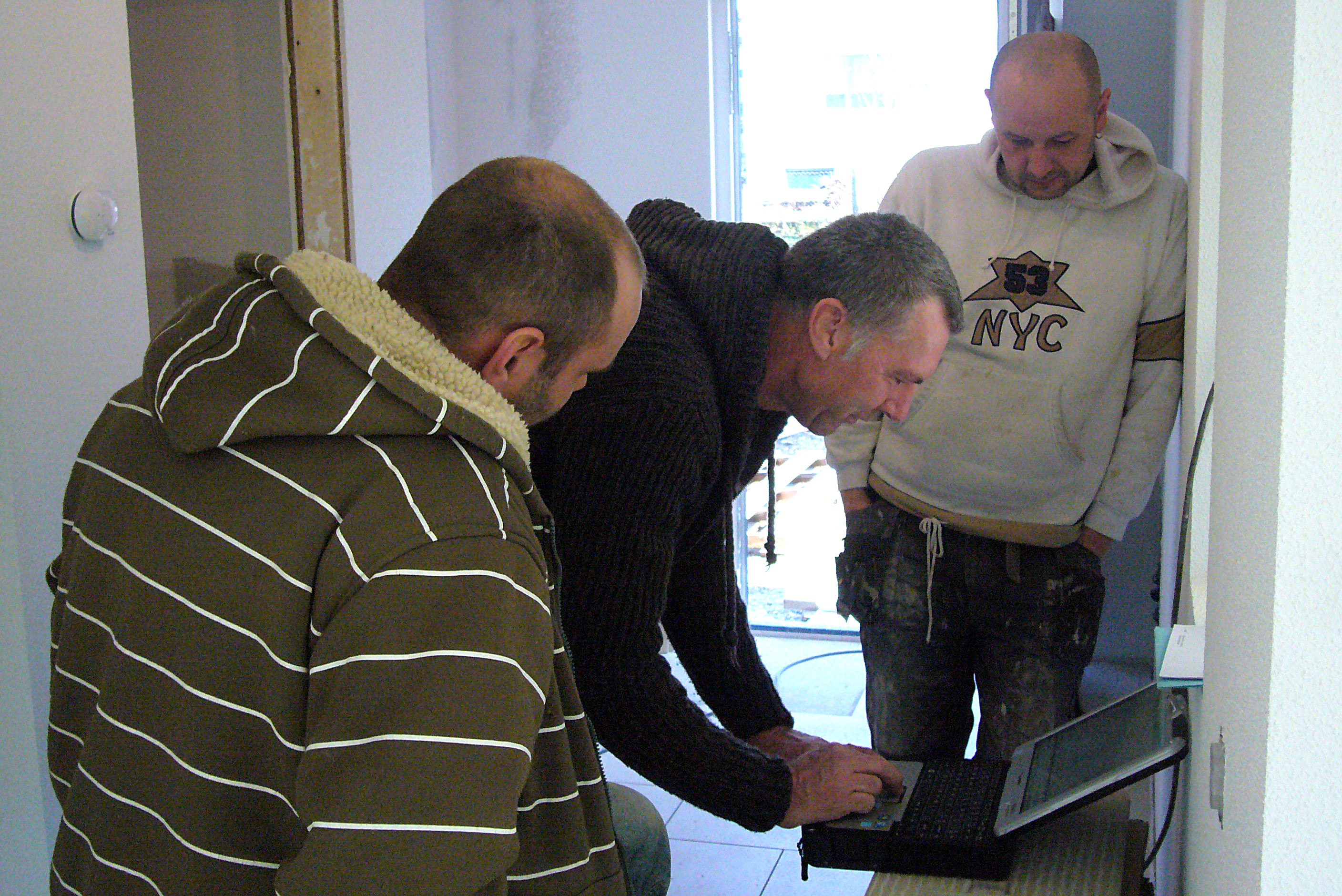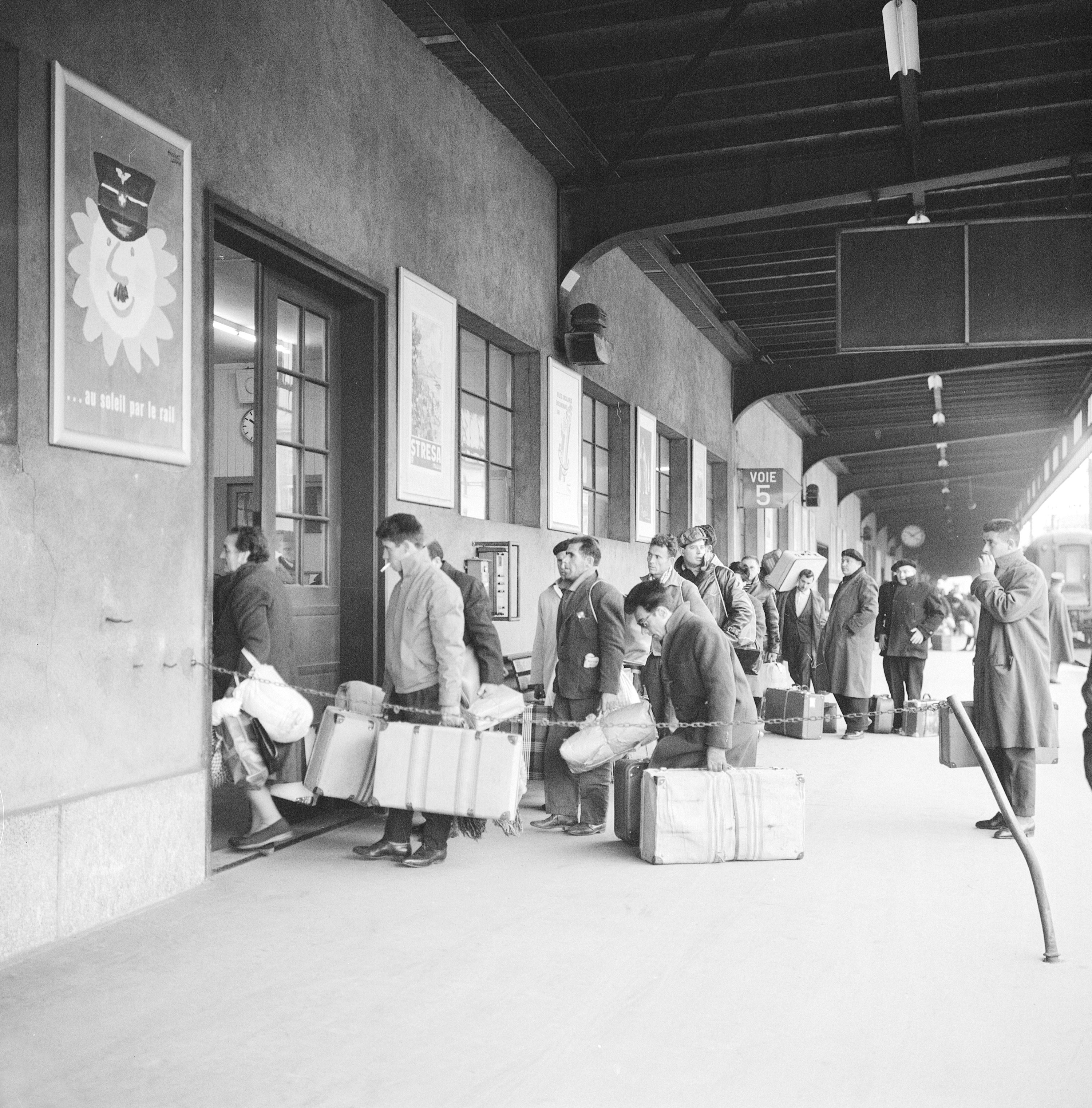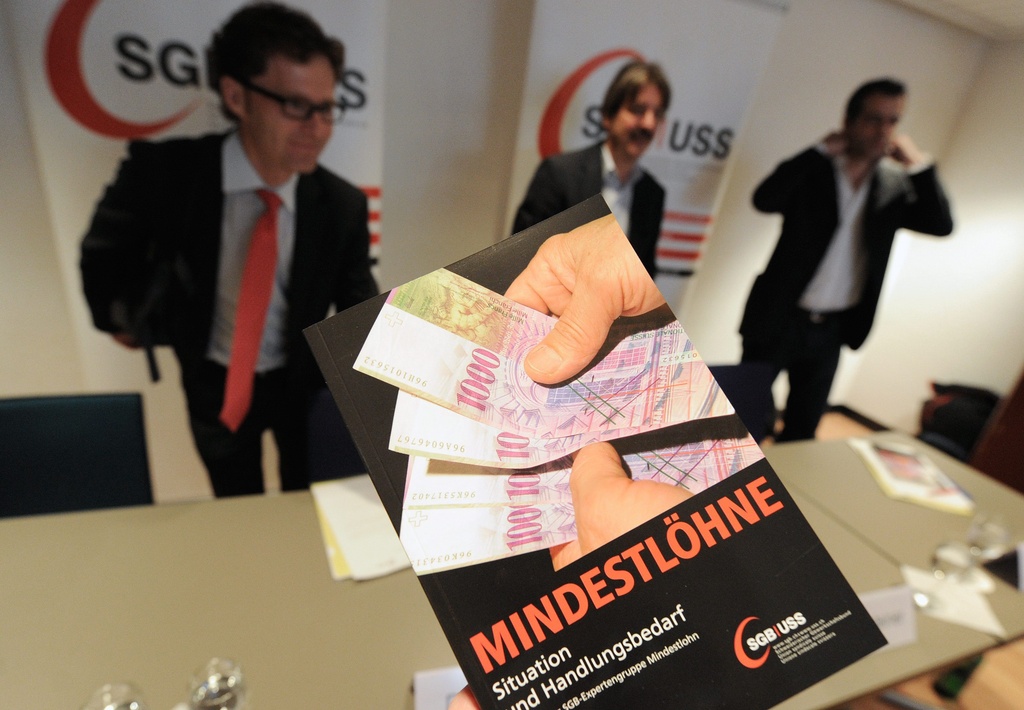Site inspections track labour law abuses

For almost ten years Switzerland and the European Union have had an agreement allowing the free movement of people, effectively creating a common labour market.
To safeguard against wage and social dumping, accompanying measures were agreed. In Switzerland, inspectors are charged with checking that these are adhered to. swissinfo.ch accompanied an inspector on a construction site visit.
“Hello, we met once before, in 2009”. Stefan Hirt greets the two German tile layers in a friendly but not too familiar way. In Vinelz, near Lake Biel, the foreign workers are laying dark stone tiles on the ground floor of a prefabricated house.
The Swiss official opens his laptop on an improvised shelf in the entrance. An inspector from the canton Bern labour control office, Hirt wants to check whether the men’s German employer has rectified some shortcomings identified at the check nearly three years ago.
After checking the personal details on their identity cards, he begins questioning the tile layers. Hirt types in the answers they willingly provide: they are in Switzerland for five days; one earns €14.70 (SFr17.81) an hour, the other €14; they work ten hours a day, and overtime is compensated.
Accommodation including breakfast is paid for by their German employer. They receive an allowance of €15 for lunch and dinner; have 30 days holiday a year; travel time counts as work time – if only from the Swiss border – and their employer is liable for wage adjustments.
Allowances
“The allowances to cover basic daily expenses are probably too low,” concludes Hirt, getting behind the wheel of his car 15 minutes later.
He says he will ask the German employer to provide proof that they are in fact paying the wage adjustments stipulated by law. Hirt’s reports and the documents will be passed to the relevant labour equality commission. Should this commission, made up of employers and employees, find violations of the law on the posting of foreign workers (see sidebar), it will apply sanctions, ranging from a warning to a fine to a ban on the contractor that posted the workers to Switzerland.
“Checking that the law on the posting of foreign workers is respected is our main task,” says Hirt. The skilled carpenter-foreman spent many years working in the construction industry. An inspector for several years, he also knows labour law inside and out.
Apart from Hirt, who is interim head, the Bern labour control office includes four men and one woman inspector. There are also two full-time administrative positions.
Last year Hirt’s team checked almost 3,400 foreign workers. In roughly half of all cases infringements of the law were discovered.
Hirt sees his role as an important contribution to safeguarding conditions on the Swiss labour market. “The inspections ensure a level playing field in the tender process and awarding of contracts,” he says, adding “I would like my children one day to be able to live here on what they earn.”
Self-employed
Without checks, Swiss firms and construction contractors would soon be recruiting more workers abroad, particularly in eastern Europe, where wages are increasingly coming under pressure, according to Hirt. But Swiss firms would also be awarding more contracts in the EU and European Free Trade Association (Efta) countries.
The working conditions of the contracted staff can be relatively easily checked since they are the employees of a foreign agency that sends workers abroad. As these firms have to register their staff with the cantonal authorities, the inspectors know exactly where the workers are and for how long.
It is a different matter for foreign workers who falsely claim to be self-employed. It is a very laborious task trying to confirm the truth of the claim. This type of abuse is rapidly increasing. (see sidebar)
The next stopping off point on Hirt’s inspection tour is a Swiss construction firm near Lyss. It is manufacturing a conveyor for building materials for a German metal working company.
The German metal worker, who is in charge of the project, earns €14.50 an hour. The 45-year-old father of three has been with the same employer since 1996.
The metal worker doesn’t know if he gets allowances to cover basic expenses, but overtime is paid.
After an inspection lasting just a few minutes Hirt comes to the same conclusion as with the tile layers. He will request more information from the German metal working company on the allowances paid, and also proof of wage adjustment.
Winners and losers
Back to the tile layers in Vinelz. Compared with a group of Lithuanian timber workers, which Hirt inspected at the end of 2010 in the Bernese Jura region, they are living like kings – despite their low daily allowances.
The Lithuanians worked for an hourly rate of an incredible SFr2.50 ($2.63). What they ate, they brought with them.
“I feel sorry that they will never receive what is their due,” Hirt said.
The tile layers, on the other hand, can make €300 per week in Switzerland more than they would earn at home across the border – almost double the pay in Germany.
The free movement of people is one of the cornerstones of the bilateral agreements between Switzerland and the EU.
The Agreement on the Free Movement of Persons came into force on June 1, 2002.
The success of various sectors of industry is to a large extent dependent on access to the skilled EU workforce.
In a recent survey, two thirds of 501 Swiss small and medium enterprises said they saw free movement as an opportunity. 21 % regarded it as a risk.
“Accompanying measures“ for the protection of the Swiss market from wage and social dumping were brought in under pressure from the unions.
Cantonal labour market inspectors, funded 50% by the State Secretariat for Economic Affairs, monitor adherence to the these measures.
However the government announced on Friday it would increase its oversight of accompanying measures and demand from the cantons more systematic and transparent action in wage dumping cases.
In 2010 some 36,000 businesses were checked, 40% more than in the previous year.
More than 50 per cent of foreign workers posted to Switzerland in 2010 were monitored.
Of the businesses which employ staff under a collective work agreement, which includes a minimum wage, inspectors found that 38 per cent of foreign contractors and 41 per cent of Swiss firms in this category had not respected the agreed salary conditions.
This was a significant increase on 2009 when the rates were 21 per cent and 30 per cent respectively.
More and more employers are side-stepping employment law by taking on foreign employees to Switzerland under the guise of self-employed contractors.
It is difficult to prove if a particular person is economically dependent on the employer, whether they work full-time or have other contracts.
Economics Minister Johann Schneider-Ammann wants to tackle the problem by imposing stricter documentation requirements on the self-employed.
Inspectors in 2010 suspected that one in four contractors were merely posing as self-employed.
(Translated from German by Morven McLean)

In compliance with the JTI standards
More: SWI swissinfo.ch certified by the Journalism Trust Initiative














You can find an overview of ongoing debates with our journalists here . Please join us!
If you want to start a conversation about a topic raised in this article or want to report factual errors, email us at english@swissinfo.ch.